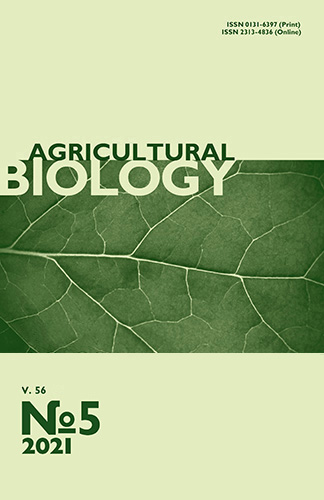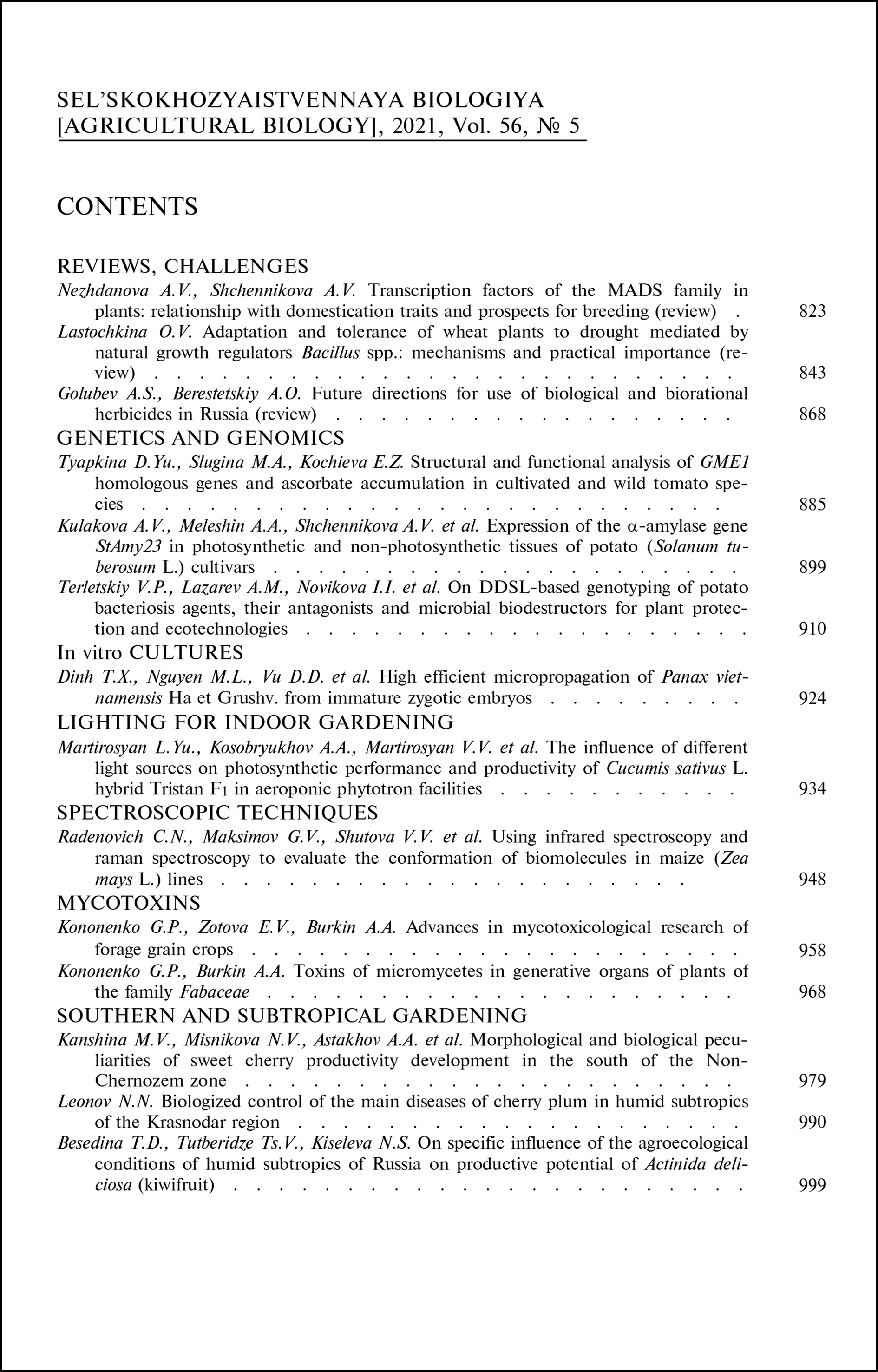doi: 10.15389/agrobiology.2021.5.843eng
UDC: 633.11:632.112:631.8:579.64
Acknowledgements:
Supported financially from the Russian Foundation for Basic Research, the Project No. 20-116-50151
ADAPTATION AND TOLERANCE OF WHEAT PLANTS TO DROUGHT MEDIATED BY NATURAL GROWTH REGULATORS Bacillus spp.: MECHANISMS AND PRACTICAL IMPORTANCE (review)
O.V. Lastochkina ✉
Institute of Biochemistry and Genetics — Subdivision of the Ufa Federal Research Center RAS, 71, pr. Oktyabrya, Ufa, Russia 450054, e-mail oksanaibg@gmail.com (✉ corresponding author)
ORCID:
Lastochkina O.V. orcid.org/0000-0003-3398-1493
Received April 7, 2021
Environmental abiotic factors leading to water deficiency significantly limit the production of major crops worldwide (Z. Ahmad et al., 2018). In the face of rapid population growth and climate change, it is important to ensure food security, which is mainly possible by increasing the productivity of strategically important crops, including wheat, which is used for human consumption in many regions of the world and provides more than 50 % of food energy needs (S. Asseng et al., 2019). Application of beneficial growth-stimulating bacteria Bacillus spp. are effective, environmentally friendly and safe natural strategy for protecting plants from stresses resulting in water deficiency (M. Kaushal et al., 2019; A. Hussain et al., 2020; M. Camaille et al., 2021). To date, the growth-stimulating and protective effect of Bacillus spp. under various abiotic stresses are indicated for a wide range of plants (S. Moon et al., 2017; H.G. Gowtham et al., 2020; N. Shobana et al., 2020), including wheat (G. Sood et al., 2020; U. Rashid et al., 2021). The mechanisms of this physiological action of Bacillus spp. on host plants remain largely unknown. Presumably, it is due to i) competition for space and nutrients with plant pathogens and increased availability of macro- and micronutrients (S. Danish et al., 2019; D. Miljakovic et al., 2020; А. Kumar et al., 2021), ii) production of a wide range of bioactive components and protective compounds (M. Saha et al., 2016; R. Çakmakçı et al., 2017; N. Ilyas et al., 2020), and iii) induction of plant systemic tolerance to stresses (I.A. Abd El-Daim et al., 2019; C. Blake et al., 2021; U. Rashid et al., 2021). The efficacy of the same Bacillus strain may vary, depending on many factors including a spectrum of the synthesized compounds, strains, plant species, ecological and geographical origin, varietal characteristics, the types of stresses during the growing season, etc. (A. Khalid et al., 2004; G. Salem et al., 2018; O. Lastochkina et al., 2020). This review summarizes an information on the current state of research and the latest available information on plant-microbe interactions with a focus on protecting wheat against drought. In particular, the mechanisms underlying Bacillus-mediated adaptation and tolerance of wheat plants to drought are under consideration. It is shown that Bacillus spp. can induce wheat drought tolerance due to i) synthesis of compounds which provide protection against osmotic and oxidative stresses (D. Miljakovic et al., 2020; R. Çakmakçı et al., 2017), ii) intracellular transmission and enhancement of protective signals by a cascade of mediators, iii) regulation of the protective protein gene expression and interorgan transduction with the participation of the main phytohormones, their biosynthesis in the whole plant (U. Rashid et al., 2021), and iv) numerous compounds involved in increasing the bioavailability of macro- and microelements and productivity (А. Hussain et al., 2020; А. Kumar et al., 2021). Bacillus spp. can positively influence plant photosynthesis and water exchange (I.A. Abd El-Daim et al., 2019), as well as drought tolerance of wheat genotypes of different agroecological groups (L.I. Pusenkova et al., 2020). The joint use of Bacillus bacteria with other natural growth regulators enhance their effectiveness and stability of action (M. Zafar-ul-Hye et al., 2019). The listed commercial bacillary biologicals are effective on wheats. The review contributes to the understanding of the fundamental mechanisms of wheat—Bacillus spp. interactions under drought, the development of Bacillus-based biologicals and their use in ecologically oriented technologies for wheat growing under changing climate conditions.
Keywords: plant growth-stimulating bacteria, Bacillus spp., wheat, drought, defense mechanisms, plant-microbe interactions, induced systemic tolerance.
REFERENCES
- FAO. The state of food and agriculture. Climate change, agriculture and food security, 2016. Available: http://www.fao.org/3/a-i6030e.pdf. No date.
- FAO. Cereal supply and demand brief, 2021. Available: http://www.fao.org/worldfoodsituation/csdb/ru/. No date.
- Di Benedetto N.A., Corbo M.R., Campaniello D., Cataldi M.P., Bevilacqua A., Sinigaglia M., Flagella Z. The role of plant growth promoting bacteria in improving nitrogen use efficiency for sustainable crop production: a focus on wheat. AIMS Microbiology, 2017, 3(3): 413-434 CrossRef
- Ahmad Z., Waraich E.A., Akhtar S., Anjum S., Ahmad T., Mahboob W., Hafeez O.B.A., Tapera T., Labuschagne M., Rizwan M. Physiological responses of wheat to drought stress and its mitigation approaches. Acta Physiologiae Plantarum, 2018, 40: 80 CrossRef
- Cramer G.R., Urano K., Delrot S., Pezzotti M., Shinozaki K. Effects of abiotic stress on plants: a systems biology perspective. BMC Plant Biology, 2011, 11: 163 CrossRef
- Farooq M., Wahid A., Kobayashi N., Fujita D., Basra S.M.A. Plant drought stress: effects, mechanisms and management. Agronomy Sustainable Development, 2009, 29: 185-212 CrossRef
- Asseng S., Martre P., Maiorano A., Rötter R.P., O’Leary G.J., Fitzgerald G.J., Girousse C., Motzo R., Giunta F., Ali Babar M., Reynolds M.P., Kheir A.M.S., Thorburn P.J., Waha K., Ruane A.C., Aggarwal P.K., Ahmed M., Balkovič J., Basso B., Biernath K., Bindi M., Cammar-ano D., Challinor A.J., De Sanctis G., Dumont B., Eyshi Rezaei E., Fereres E., Ferrise R., Garcia‐Vila M., Gayler S., Gao Y., Horan H., Hoogenboom G., César Izaurralde R., Jabloun M., Jones C.D., Kassie B.T., Kersebaum K.-Ch., Klein C., Koehler A.-K., Liu B., Minoli S., San Martin M.M., Müller C., Kumar S.N., Nendel C., Olesen J.E., Palosuo T., Porter J.R., Priesack E., Ripoche D., Semenov M.A., Stöckle S., Stratonovitch P., Streck T., Supit I., Tao F., Van der Velde M., Wallach D., Wang E., Webber H., Wolf J., Xiao L., Zhang Z., Zhao Z., Zhu Y., Ewert F. Climate change impact and adaptation for wheat protein. Global Change Biology, 2019, 25: 155-173 CrossRef
- Lockyer S., White A., Buttriss J.L. Biofortified crops for tackling micronutrient deficiencies — what impact are these having in developing countries and could they be of relevance within Europe? Nutrition Bulletin, 2018, 43: 319-357 CrossRef
- Baez-Rogelio A., Morales-García Y.E., Quintero-Hernández V., Muñoz-Rojas J. Next generation of microbial inoculants for agriculture and bioremediation. Microbial Biotechnology, 2017, 10(1): 19-21 CrossRef
- Ma Y. Beneficial bacteria for disease suppression and plant growth promotion. In: Plant-microbe interactions in agro-ecological perspectives. D. Singh, H. Singh, R. Prabha (eds.). Springer, Singapore, 2017: 513-529 CrossRef
- Numan M., Bashir S., Khan Y., Mumtaz R., Shinwari Z.K., Khan A.L., Khan A., AL-Harrasi A. Plant growth promoting bacteria as an alternative strategy for salt tolerance in plants: a review. Microbiological Research, 2018, 209: 21-32 CrossRef
- Sarma B.K., Yadav K.S., Singh D.P., Singh H.B. Rhizobacteria mediated induced systemic tolerance in plants: prospects for abiotic stress management. In: Bacteria in Agrobiology: stress management. D. Maheshwari (ed.). Springer-Verlag, Berlin, Heidelberg, 2012: 225-238 CrossRef
- Lastochkina O., Aliniaeifard S., Kalhor M.S., Yuldashev R., Pusenkova L., Garipova S. Plant growth promoting bacteria — biotic strategy to cope with abiotic stresses in wheat. In: Wheat production in changing environments: Management, adaptation and tolerance /M. Hasanuzzaman, K. Nahar, A. Hossain (eds.). Springer, Singapore, 2019: 579-614 CrossRef
- Awan S.A., Ilyas N., Khan I., Raza M.A., Rehman A.U., Rizwan M., Rastogi A., Tariq R., Brestic M. Bacillus siamensis reduces cadmium accumulation and improves growth and antioxidant defense system in two wheat (Triticum aestivum L.) varieties. Plants, 2020, 9: 878 CrossRef
- Velloso C.C.V., Ribeiro V.P., de Carvalho C.G., de Oliveira Christiane A.U., de Paula Lana G., Marriel I.E., de Sousa S.M., Gomes E.A. Tropical endophytic Bacillus species enhance plant growth and nutrient uptake in cereals. In: Endophytes: mineral nutrient management. Sustainable development and biodiversity. D.K. Maheshwari, S. Dheeman (eds.). Springer Nature, Switzerland, Cham, 2021: 157-180 CrossRef
- Lastochkina O. Bacillus subtilis-mediated abiotic stress tolerance in plants. In: Bacilli and agrobiotechnology: phytostimulation and biocontrol. M.T. Islam, M.M. Rahman, P. Pandey, M.H. Boehme, G. Haesaert (eds.). Switzerland, Springer, 2019: 97-133 CrossRef
- Sood G., Kaushal R., Sharma M. Significance of inoculation with Bacillus subtilis to alleviate drought stress in wheat (Triticum aestivum L.). Vegetos, 2020, 33: 782-792 CrossRef
- Akram W., Anjum T., Ali B., Ahmad A. Screening of native Bacillus strains to induce systemic resistance in tomato plants against Fusarium wilt in split root system and its field applications. International Journal of Agriculture and Biology, 2013, 15: 1289-1294.
- Lastochkina O., Seifi Kalhor M., Aliniaeifard S., Baymiev An., Pusenkova L., Garipova S., Kulabuhova D., Maksimov I. Bacillus spp.: efficient biotic strategy to control postharvest diseases of fruits and vegetables. Plants, 2019, 8(4): 97 CrossRef
- Maksimov I.V., Blagova D.K., Veselova S.V., Sorokan A.V., Burkhanova G.F., Cherepanova E.A., Sarvarova S.D., Rumyantsev V., Alekseev Yu., Khayrullin R.M. Recombinant Bacillus subtilis 26DCryChS line with gene Btcry1Ia encoding Cry1Ia toxin from Bacillus thuringiensis promotes integrated wheat defense against pathogen Stagonospora nodorum Berk. and greenbug Schizaphis graminum Rond. Biological Control,2020, 144: 104242 CrossRef
- Cantoro R., Palazzini J.M., Yerkovich N., Miralles D.J., Chulze S.N. Bacillus velezensis RC 218 as a biocontrol agent against Fusarium graminearum: effect on penetration, growth and TRI5 expression in wheat spikes. Biological Control, 2021, 66: 259-270 CrossRef
- Lastochkina O., Baymiev A., Shayahmetova A., Garshina D., Koryakov I., Shpirnaya I., Pusenkova L., Mardanshin I., Kasnak C., Palamutoglu R. Effects of endophytic Bacillus subtilis and salicylic acid on postharvest diseases (Phytophthora infestans, Fusarium oxysporum) development in stored potato tubers. Plants, 2020, 9: 76 CrossRef
- Miljakovic D., Marinkovic J., Balesevic-Tubic S. The significance of Bacillus spp. in disease suppression and growth promotion of field and vegetable crops. Microorganisms, 2020, 8: 1037 CrossRef
- Cherif H., Marasco R., Rolli E., Ferjani R., Fusi M., Soussi A., Mapelli F., Blilou I., Borin S., Boudabous A., Cherif A., Daffonchio D., Ouzari H. Oasis desert farming selects environment-specific date palm root endophytic communities and cultivable bacteria that promote resistance to drought. Environmental Microbiology Reports, 2015, 7: 668-678 CrossRef
- Blake C., Christensen M.N., Kovács Á. Molecular aspects of plant growth promotion and protection by Bacillus subtilis. Molecular Plant-Microbe Interactions, 2021, 34(1): 15-25 CrossRef
- Çakmakçı R., Turan M., Kıtır N., Güneş A., Nikerel E., Özdemir B.S., Yıldırım E., Olgun M., Topçuoğlu B., Tüfenkçi Ş., Karaman M.R., Tarhan L., Mokhtari N.E.P. The role of soil beneficial bacteria in wheat production: a review. In: Wheat improvement, management and utilization. R. Wanyera, J. Owuoche (eds.). IntechOpen Limited, London, 2017: 115-149 CrossRef
- Shobana N., Sugitha T., Sivakumar U. Plant growth-promoting Bacillus sp. cahoots moisture stress alleviation in rice genotypes by triggering antioxidant defense system. Microbiological Research, 2020, 239: 126518 CrossRef
- Lastochkina O., Pusenkova L., Yuldashev R., Babaev M., Garipova S., Blagova D., Khairullin R., Aliniaeifard S. Effects of Bacillus subtilis on some physiological and biochemical parameters of Triticum aestivum L. (wheat) under salinity. Plant Physiology and Biochemistry, 2017, 121: 80-88 CrossRef
- Ilyas N., Mumtaz K., Akhtar N., Yasmin H., Sayyed R.Z., Khan W., Enshasy H.A.E., Dailin D.J., Elsayed E.A., Ali Z. Exopolysaccharides producing bacteria for the amelioration of drought stress in wheat. Sustainability, 2020, 12: 8876 CrossRef
- Meenakshi S., Annapurna K., Govindasamy V., Ajit V., Choudhary D.K. Mitigation of drought stress in wheat crop by drought tolerant endophytic bacterial isolates. Vegetos, 2019, 32: 486-493 CrossRef
- Lastochkina O., Garshina D., Allagulova C., Fedorova K., Koryakov I., Vladimirova A. Application of endophytic Bacillus subtilis and salicylic acid to improve wheat growth and tolerance under combined drought and Fusarium root rot stresses. Agronomy, 2020, 10: 1343 CrossRef
- Jochum M.D., McWilliams K.L., Borrego E.J., Kolomiets M.V., Niu G., Pierson E.A., Jo Y.K. Bioprospecting plant growth-promoting rhizobacteria that mitigate drought stress in grasses. Frontiers in Microbiology, 2019, 10: 2106 CrossRef
- Hussain A., Ahmad M., Nafees M., Iqbal Z., Luqman M., Jamil M., Maqsood A., Mora-Poblete F., Ahmar S., Chen J.-T., Alyemeni M.N., Ahmad P. Plant-growth-promoting Bacillus and Paenibacillus species improve the nutritional status of Triticum aestivum L.. PLoS ONE, 2020, 15(12): e0241130 CrossRef
- Lastochkina O., Garshina D., Ivanov S., Yuldashev R., Khafizova R., Allagulova Ch., Fedorova K., Avalbaev A., Maslennikova D., Bosacchi M. Seed priming with endophytic Bacillus subtilis modulates physiological responses of two different Triticum aestivum L. cultivars under drought stress. Plants, 2020, 9(12): 1810 CrossRef
- Kaushal M. Portraying rhizobacterial mechanisms in drought tolerance: a way forward toward sustainable agriculture. In: PGPR amelioration in sustainable agriculture. A.K. Singh, A. Rumar, P.K. Singh (eds.). Elsevier Inc., 2019: 195-216 CrossRef
- Oleńska E., Małek W., Wójcik M., Swiecicka I., Thijs S., Vangronsveld J. Beneficial features of plant growth-promoting rhizobacteria for improving plant growth and health in challenging conditions: a methodical review. Science of the Total Environment, 2020, 743: 140682 CrossRef
- Baig K.S., Arshad M., Shaharoona B., Khalid A., Ahmed I. Comparative effectiveness of Bacillus spp. possessing either dual or single growth-promoting traits for improving phosphorus uptake, growth and yield of wheat (Triticum aestivum L.). Annals of Microbiology, 2012, 62(3): 1109-1119 CrossRef
- Saha M., Sarkar S., Sarkar B., Sharma B.K., Bhattacharjee S., Tribedi P. Microbial siderophores and their potential applications: a review. Environmental Science and Pollution Research, 2016, 23(5): 3984-3999 CrossRef
- Kumar A., Ram Maurya B., Raghuwanshi R. The microbial consortium of indigenous rhizobacteria improving plant health, yield and nutrient content in wheat (Triticum aestivum). Journal of Plant Nutrition, 2021, 44(13): 1942-1956 CrossRef
- Timmusk S., Abd El-Daim I.A., Copolovici L., Tanilas T., Kännaste A., Behers L., Nevo E., Seisenbaeva G., Stenström E., Niinemets Ü. Drought-tolerance of wheat improved by rhizosphere bacteria from harsh environments: enhanced biomass production and reduced emissions of stress volatiles. PLoS ONE, 2014, 9(5): e96086 CrossRef
- Abd El-Daim I.A., Bejai S., Meijer J. Bacillus velezensis 5113 induced metabolic and molecular reprogramming during abiotic stress tolerance in wheat. Scientific Reports, 2019, 9: 16282 CrossRef
- Kaushal M. Microbes in cahoots with plants: MIST to hit the jackpot of agricultural productivity during drought. International Journal of Molecular Sciences, 2019, 20: 1769 CrossRef
- Abd El-Daim I.A., Bejai S., Fridborg I., Meijer J. Identifying potential molecular factors involved in Bacillus amyloliquefaciens 5113 mediated abiotic stress tolerance in wheat. Plant Biology, 2018, 20: 271-279 CrossRef
- Zafar-ul-Hye M., Danish S., Abbas M., Ahmad M., Munir T.M. ACC deaminase producing PGPR Bacillus amyloliquefaciens and Agrobacterium fabrum along with Biochar improve wheat productivity under drought stress. Agronomy, 2019, 9: 343 CrossRef
- Danish S., Zafar-ul-Hye M., Hussain M., Shaaban M., Núñez-Delgado A., Hussain S., Qayyum M.F. Rhizobacteria with ACC-deaminase activity improve nutrient uptake, chlorophyll contents and early seedling growth of wheat under PEG-induced osmotic stress. International Journal of Agriculture and Biology, 2019, 21: 1212-1220 CrossRef
- Danish S., Zafar-ul-Hye M. Co-application of ACC-deaminase producing PGPR and timber-waste biochar improves pigments formation, growth and yield of wheat under drought stress. Scientific Reports, 2019, 9: 5999 CrossRef
- Zhang H., Murzello C., Sun Y., Kim M.S., Xie X., Jeter R.M., Zak J.C., Dowd S.E., Pare P.W. Choline and osmotic-stress tolerance induced in Arabidopsis by the soil microbe Bacillus subtilis (GB03). Molecular Plant-Microbe Interactions, 2010, 23: 1097-1104 CrossRef
- Su A.Y., Niu S.Q., Liu Y.Z., He A.L., Zhao Q., Paré P.W., Li M.F., Han Q.Q., Ali Khan S., Zhang J.L. Synergistic effects of Bacillus amyloliquefaciens (GB03) and water retaining agent on drought tolerance of perennial ryegrass. International Journal of Molecular Sciences, 2017, 18(12): 2651 CrossRef
- Zhang N., Yang D., Wang D., Miao Y., Shao J., Zhou X., Xu Z., Li Q., Feng H., Li S., Shen Q., Zhang R. Whole transcriptomic analysis of the plant-beneficial rhizobacterium Bacillus amyloliquefaciens SQR9 during enhanced biofilm formation regulated by maize root exudates. BMC Genomics, 2015, 16: 685 CrossRef
- Khan N., Bano A. Exopolysaccharide producing rhizobacteria and their impact on growth and drought tolerance of wheat grown under rainfed conditions. PLoS ONE, 2019, 14(9): e0222302 CrossRef
- Gowtham H.G., Brijesh S.S., Murali M., Shilpa N., Melvin P., Mohammed A., Amruthesh K.N., Niranjana S.R. Induction of drought tolerance in tomato upon the application of ACC deaminase producing plant growth promoting rhizobacterium Bacillus subtilis Rhizo SF 48. Microbiological Research, 2020, 234: 126422 CrossRef
- Rashid U., Yasmin H., Hassan M.N., Naz R., Nosheen A., Sajjad M., Ilyas N., Keyani R., Jabeen Z., Mumtaz S., Alyemeni M.N., Ahmad P. Drought-tolerant Bacillus megaterium isolated from semi-arid conditions induces systemic tolerance of wheat under drought conditions. Plant Cell Reports, 2021, a Collection: 1-21 CrossRef
- Amna, Ud Din B., Sarfraz S., Xia Y., Kamran M.A., Javed M.T., Sultan T., Munis M.F.H., Chaudhary H.J. Mechanistic elucidation of germination potential and growth of wheat inoculated with exopolysaccharide and ACC-deaminase producing Bacillus strains under induced salinity stress. Ecotoxicology and Environmental Safety, 2019, 183: 109466 CrossRef
- Salem G., Stromberger M.E., Byrne P.F., Manter D.K., El-Feki W., Weir T.L. Genotype-specific response of winter wheat (Triticum aestivum L.) to irrigation and inoculation with ACC deaminase bacteria. Rhizosphere, 2018, 8: 1-7 CrossRef
- Pusenkova L.I., Garipova S.R., Lastochkina O.V., Yuldashev R.A. Problemy agrokhimii i ekologii, 2020, 3: 56-64 CrossRef (in Russ.).
- Pishchik V.N., Vorob'ev N.I., Moiseev K.G., Sviridova O.V., Surin V.G. Pochvovedenie, 2015, 1: 87-94 CrossRef (in Russ.).
- Ramesh A., Sharma S.K., Yadav N., Joshi O.P. Phosphorus mobilization from native soil P-pool upon inoculation with phytate-mineralizing and phosphate-solubilizing Bacillus aryabhattai isolates for improved P-acquisition and growth of soybean and wheat crops in microcosm conditions. Agricultural Research, 2014, 3: 118-127 CrossRef
- Kour D., Rana K.L., Yadav A.N., Yadav N., Kumar V., Kumar A., Sayyed R.Z., Hesham A.E.-L., Dhaliwal H.S., Saxena A.K. Drought-tolerant phosphorus-solubilizing microbes: Biodiversity and biotechnological applications for alleviation of drought stress in plants. In: Plant growth promoting rhizobacteria for sustainable stress management. Microorganisms for sustainability. R. Sayyed, N. Arora, M. Reddy (eds.). Springer, Singapore, 2019: 255-308 CrossRef
- Rodríguez H., Gonzalez F.T., Bashan Y. Genetics of phosphate solubilization and its potential applications for improving plant growth-promoting bacteria. Plant and Soil, 2006, 287(1-2): 15-21 CrossRef
- Ramesh A., Sharma S.K., Sharma M.P., Yadav N., Joshi O.P. Inoculation of zinc solubilizing Bacillus aryabhattai strains for improved growth, mobilization and biofortification of zinc in soybean and wheat cultivated in Vertisols of central India. Applied Soil Ecology, 2014, 73: 87-96 CrossRef
- Albelda-Berenguer M., Monachon M., Joseph E. Siderophores: from natural roles to potential applications. Advances in Applied Microbiology, 2019, 106: 193-225 CrossRef
- Beck E.H., Fetitig S., Knake C., Hartig K., Bhattarai T. Specific and unspecific responses of plants to cold and drought stress. Journal of Biosciences, 2007, 32: 501-510 CrossRef
- Barnawal D., Bharti N., Pandey S.S., Pandey A., Chanotiya C.S., Kalra A. Plant growth promoting rhizobacteria enhances wheat salt and drought stress tolerance by altering endogenous phytohormone levels and TaCTR1/TaDREB2 expression. Physiologia Plantarum, 2017, 161: 502-514 CrossRef
- Sharma M.P., Grover M., Chourasiya D., Bharti A., Agnihotri R., Maheshwari H.S., Pareek A., Buyer J.S., Sharma S.K., Schütz L., Mathimaran N., Singla-Pareek S.L., Grossman J.M., Bagyaraj D.J. Deciphering the role of trehalose in tripartite symbiosis among rhizobia, arbuscular mycorrhizal fungi, and legumes for enhancing abiotic stress tolerance in crop plants. Frontiers in Microbiology, 2020, 11: 509919 CrossRef
- Yadav R., Ror P., Rathore P., Kumar S., Ramakrishna W. Bacillus subtilis CP4, isolated from native soil in combination with arbuscular mycorrhizal fungi promotes biofortification, yield and metabolite production in wheat under field conditions. Journal of Applied Microbiology, 2021, 131(1): 339-359 CrossRef
- Zhou C., Ma Z., Zhu L., Xia X., Xie Y., Zhu J., Wang J. Rhizobacterial strain Bacillus megaterium BOFC15 induces cellular polyamine changes that improve plant growth and drought resistance. International Journal of Molecular Sciences, 2016, 17: 976 CrossRef
- Naseem H., Ahsan M., Shahid M.A., Khan N. Exopolysaccharides producing rhizobacteria and their role in plant growth and drought tolerance. Journal of Basic Microbiology, 2018, 58(12): 1009-1022 CrossRef
- Kasim W.A., Osman M.E., Omar M.N., Abd El-Daim I.A., Bejai S., Meijer J. Control of drought stress in wheat using plant-growth-promoting bacteria. Journal of Plant Growth Regulation, 2013, 32: 122-130 CrossRef
- Eichmann R., Richards L., Schäfer P. Hormones as go‐betweens in plant microbiome assembly. Plant Journal, 2021, 105(2): 518-541 CrossRef
- Camaille M., Fabre N., Clément C., Ait Barka E. Advances in wheat physiology in response to drought and the role of plant growth promoting rhizobacteria to trigger drought tolerance. Microorganisms, 2021, 9: 687 CrossRef
- Sivasakthi S., Kanchana D., Usharani G., Saranraj P. Production of plant growth promoting substance by Pseudomonas fluorescens and Bacillus subtilis isolated from paddy rhizosphere soil of Cuddalore district, Tamil Nadu, India. International Journal of Microbiology Research, 2013, 4(3): 227-233 CrossRef
- Ishak Z., Mohd Iswadi M.K., Russman Nizam A.H., Ahmad Kamil M.J., Ernie Eileen R.R., Wan Syaidatul A., Ainon H. Plant growth hormones produced by endophytic Bacillus subtilis strain LKM-BK isolated from cocoa. Malaysian Cocoa Journal,2016, 9(1): 127-133.
- Moon S., Asif R., Basharat A. Phylogenetic diversity of drought tolerant Bacillus spp. and their growth stimulation of Zea mays L. under different water regimes. Research Journal of Biotechnology, 2017, 12(10): 38-46.
- Ahmad Z., Wu J., Chen L., Dong W. Isolated Bacillus subtilis strain 330-2 and its antagonistic genes identified by the removing PCR. Scientific Reports, 2017, 7(1): 1777 CrossRef
- Khalid A., Arshad M., Zahir Z.A. Screening plant growth promoting rhizobacteria for improving growth and yield of wheat. Journal of Applied Microbiology, 2004, 96: 473-480 CrossRef
- Egamberdieva D., Kucharova Z. Selection for root colonising bacteria stimulating wheat growth in saline soils. Biology and Fertility of Soils, 2009, 45(6): 563-571 CrossRef
- Sessitsch A., Hardoim P., Döring J., Weilharter A., Krause A., Woyke T., Mitter B., Hauberg-Lotte L., Friedrich F., Rahalkar M., Hurek T., Sarkar A., Bodrossy L., van Overbeek L., Brar D., van Elsas J.D., Reinhold-Hurek B. Functional characteristics of an endophyte community colonizing rice roots as revealed by metagenomic analysis. Molecular Plant-Microbe Interactions, 2012, 25(1): 28-36 CrossRef
- Pandey P.K., Singh M.C., Singh S.S., Kumar A.K., Pathak M.M., Shakywar R.C., Pandey A.K. Inside the plants: endophytic bacteria and their functional attributes for plant growth promotion. International Journal of Current Microbiology and Applied Sciences, 2017, 6(2): 11-21 CrossRef
- Kuklinski-Sorbal J., Araujo W.L., Mendes R., Geraldi I.O., Pizzirani-Kleiner A.A., Azevedo J.L. Isolation and characterization of soybean-associated bacteria and their potential for plant growth promotion. Environmental Microbiology, 2004, 6(12): 1244-1251 CrossRef
- Gutiérrez‐Mañero F.J., Ramos B., Probanza A., Mehouachi J., Talon M. The plant growth promoting rhizobacteria Bacillus pumilus and Bacillus licheniformis produce high amounts of physiologically active gibberelins. Physiologia Plantarum, 2008, 111: 206-221 CrossRef
- Huang D., Wu W., Abrams S.R., Cutler A.J. The relationship of drought-related gene expression in Arabidopsis thaliana to hormonal and environmental factors. Journal of Experimental Botany, 2008, 59: 2991-3007 CrossRef
- Kang S.-M., Khan A.L., Waqas M., You Y.-H., Kim J.H., Kim J.-G., Hamayun M., Lee I.-J. Plant growth-promoting rhizobacteria reduce adverse effects of salinity and osmotic stress by regulating phytohormones and antioxidants in Cucumis sativus. Journal of Plant Interactions, 2014, 9(1): 673-682 CrossRef
- Niu D., Wang X., Wang Y., Song X., Wang J., Guo J., Zhao H. Bacillus cereus AR156 activates PAMP-triggered immunity and induces a systemic acquired resistance through a NPR1-and SA-dependent signaling pathway. Biochemical and Biophysical Research Communication,2016, 469(1): 120-125 CrossRef
- Leelasuphakul W., Sivanunsakul P., Phongpaichit S. Purification, characterization and synergistic activity of b-1,3-glucanase and antibiotic extract from an antagonistic Bacillus subtilis NSRS 89-24 against rice blast and sheath blight pathogens. Enzyme and Microbial Technology, 2006, 38: 990-997 CrossRef
- Etesami H., Beattie G.A. Plant-microbe interactions in adaptation of agricultural crops to abiotic stress conditions. In: Probiotics and health. V. Kumar, M. Kumar, S. Sharma, R. Prasad (eds.). Springer, Singapore, 2017: 163-200 CrossRef
- Seifikalhor M., Aliniaeifard S., Hassani B., Niknam V., Lastochkina O. Diverse role of γ-aminobutyric acid in dynamic plant cell responses. Plant Cell Reports, 2019, 38: 847-867 CrossRef
- Gagné-Bourque F., Bertrand A., Claessens A., Aliferis K.A., Jabaji S. Alleviation of drought stress and metabolic changes in timothy (Phleum pratense L.) colonized with Bacillus subtilis B26. Frontiers in Plant Science, 2016, 7: 584 CrossRef
- Lastochkina O.V., Yuldashev R.A., Pusenkova L.I. Izvestiya UNTS RAN, 2017, 3(1): 99-102 (in Russ.).
- Martins S.J., Medeiros F.H.V., Lakshmanan V., Bais H.P. Impact of seed exudates on growth and biofilm formation of Bacillus amyloliquefaciens ALB629 in common bean. Frontiers in Microbiology, 2018, 8: 2631 CrossRef
- Olanrewaju O.S., Ayangbenro A.S., Glick B.R., Babalola O.O. Plant health: Feedback effect of root exudates-rhizobiome interactions. Applied Microbiology and Biotechnology, 2019, 103: 1155-1166 CrossRef
- Abedinzadeh M., Etesami H., Alikhani H.A. Characterization of rhizosphere and endophytic bacteria from roots of maize (Zea mays L.) plant irrigated with wastewater with biotechnological potential in agriculture. Biotechnology Reports, 2019, 21: e00305 CrossRef
- Li Y., Shi H., Zhang H., Chen S. Amelioration of drought effects in wheat and cucumber by the combined application of super absorbent polymer and potential biofertilizer. PeerJ, 2019, 7: e6073 CrossRef
- Baris O., Sahin F., Turan M., Orhan F., Gulluce M. Use of plant-growth-promoting rhizobacteria (PGPR) seed inoculation as alternative fertilizer inputs in wheat and barley production. Communications in Soil Science and Plant Analysis, 2014, 45(18): 2457-2467 CrossRef
- Afzal A., Saleem S., Iqbal Z., Jan G., Malik M.F.A., Asad S.A. Interaction of rhizobium and Pseudomonas with wheat (Triticum aestivum L.) in potted soil with or without P2O5. Journal of Plant Nutrition, 2014, 37(13): 2144-2156 CrossRef
- Germida J., Walley F. Plant growth-promoting rhizobacteria alter rooting patterns and arbuscular mycorrhizal fungi colonization of field-grown spring wheat. Biology and Fertility of Soils, 1996, 23(2): 113-120 CrossRef
- Mushtaq Z. PGPR: present role, mechanism of action and future prospects along bottlenecks in commercialization. International Journal of Environmental Quality, 2021, 41: 9-15 CrossRef












